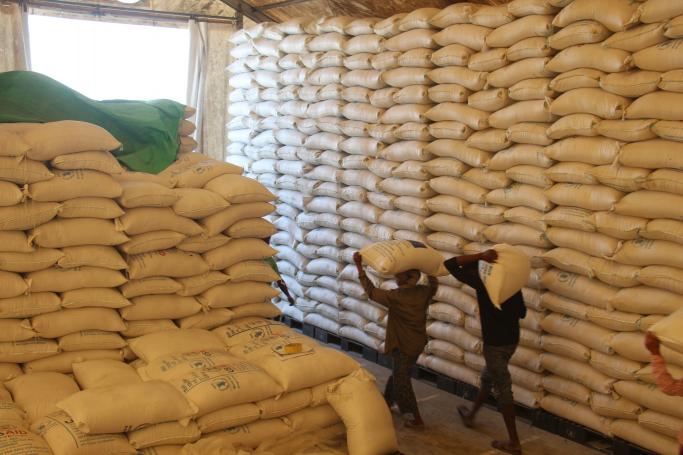In my long UN career, I worked in places that will go down in history as emblems of man’s inhumanity to man, where mass killings were a regular occurrence - the Balkans during the war in the early 1990s, Gaza, the West Bank and Syria from 2006 to 2020.
During that time, I was part of a system that witnessed and reported daily on some of the most heinous crimes of our age: the Srebrenica massacre in 1995, the siege of Yarmouk that began in 2012 and successive Israeli bombardments of Gaza which included attacks on crowded UN schools.
The UN had numerous cross-referenced eyewitness accounts, multiple monitoring and evaluation reports, endless humanitarian trend documents showing beyond doubt that under the very noses of thousands of UN workers, violations of international law were being committed as a matter of policy.
Our reports were circulated all over the system, from the Secretary General’s Office in New York, to Security Council delegations, the General Assembly, the Human Rights Council and other UN Agencies. There was no shortage of prima facie evidence of war crimes and crimes against humanity.
In time there was a criminal tribunal for the former Yugoslavia and an international inquiry on Syria. Israel, under Western protection got off Scot free.
But cut to Myanmar today and it’s clear that accountability has fallen off the agenda. Last month, the UN’s top rights official, Volker Turk said “the path out of this crisis must be anchored in accountability”, but it seems no one is listening, least of all the UN’s own sprawling humanitarian office, OCHA.
The press release about the recent visit to Myanmar by OCHA’s boss, Martin Griffiths, is proof positive of the UN’s institutional amnesia.
Aid deliveries dominated the agenda, rather than the humanitarian disaster being inflicted by the junta.
In its account of Mr Griffith’s meeting with coup leader, Min Aung Hlaing, it says in addition to the ‘need for expanded access’, Mr Griffiths raised ‘protection risks facing civilians’.
This is perhaps the only reference to the gravest threat facing the people of Myanmar – the military. Reading this release, you might not have guessed that since the coup in February 2021, security forces have killed nearly 4,000 people and arrested over 24,000, according to the most conservative estimates, nor that massacres, mass arson attacks and indiscriminate aerial bombardments against civilians are a near daily occurrence.
So what must the international community do?
Put the people of Myanmar front and centre. Their immediate needs mut be met, but they want their rights, full political rights not just UN handouts. Aid is not a replacement for justice and dignity.
Do not allow the discourse to be dominated by humanitarian issues. Focus equally on the underlying cause of the country’s long-term crisis: the refusal of the military to hand over power after an election it lost overwhelmingly and to end the war it is waging against its own people.
Do not put the regional group, ASEAN, in sole charge of resolving Myanmar’s political crisis. Their interventions to date have been laughably ineffective.
Britain as the penholder for the UN’s Myanmar policy must push for follow-up action in the Security Council after its unprecedented resolution last December. Regular public reporting to the Council to hold the junta accountable would be a good start.
Britain and other engaged UN member states must enforce a global arms embargo, naming and shaming violators such as Russia and China.
Targeted sanctions must be tightened and further pressure put on UN member states in South East Asia, such as Singapore, not to allow the junta to use their banking systems to finance atrocity crimes.
Promote accountability. Peace will be partial if war criminals are at large. UN member states must fund investigators and legal experts at the International Criminal Court, empowering the ICC to pursue justice in Myanmar just as it is in Ukraine.
Member states must open their courts to cases against the junta under the principle of universal jurisdiction. The UN’s Independent Investigative Mechanism for Myanmar has a wealth of evidence. Far fuller use must be made of it.
Donor governments must force the failing UN country team in Myanmar to implement root and branch reforms as recommended by the so called ‘Rosenthal Report ’which the Secretary General has accepted in full. There must be coherence in the UN’s engagement with Myanmar, integrating the political and the humanitarian.
Donors must also find new and innovative ways to work outside the confines of a UN country team and around the junta, which is forcing the UN to deliver aid largely to areas it controls. Cross border assistance to non-junta-controlled areas must be ramped up, as must cash assistance through Myanmar’s nationwide network of formidable citizens-based organisations.
UN member states must isolate the junta diplomatically and work more closely with Myanmar’s democratically elected National Unity Government, not just on aid delivery to areas it controls, but to resolve Myanmar’s political crisis as a full stakeholder in the country’s future.
Myanmar is a test case for the UN, a test it could pass with flying colours. But unless there is a paradigm shift, Myanmar will become another of those places where the UN presides over the delivery of humanitarian aid while the people it serves are being slaughtered.
Chris Gunness was Deputy Spokesman for the UN in the Balkans in the mid-1990s and UN Director of Communications in the Middle East from 2006 to 2020. He is currently director of the Myanmar Accountability Project.












